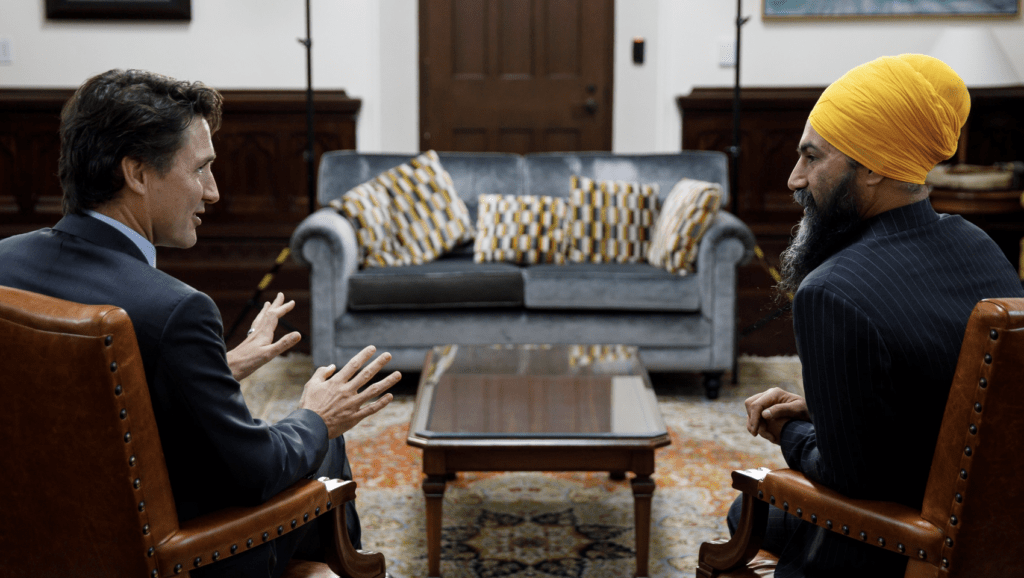Deal or No Deal? The Pros and Cons of the Liberal-NDP Non-Coalition
 Justin Trudeau/Twitter
Justin Trudeau/Twitter
Brian Topp
November 19, 2021
What are we to make of recent, artfully leaked news that Liberals and New Democrats are talking/might be talking/aren’t talking/would never consider talking about some sort of formal arrangement in the new Parliament, set to meet next week?
The only real answer is “we’ll see”, since any real dialogue between parties would be offstage. What we can do now is consider the interests our parties bring to this issue.
Let’s start with the Bloc Québécois – the Parti Québécois B team sitting in the federal Parliament.
The last time a minority government was looking for confidence and supply, in 2019, the Bloc made any serious discussion between the Liberal minority and other parties in the House irrelevant. They did this by announcing that they would support the government’s throne speech without reading it and would vote confidence in the government unconditionally. Possibly, this was intended to reassure Quebecers that they had not chosen to elect 30-odd empty seats in Parliament. We could debate whether that mission was accomplished. But what is clear is that the Bloc provided the Trudeau government with the parliamentary runway it needed at no cost.
What about now?
Coming out of his meeting with the Prime Minister on November 13th, Bloc leader Yves-François Blanchet said his team couldn’t vote for a throne speech that mentioned pipeline construction. If that is all they need, then there is no urgency to discussions with other parties. Blanchet, the brilliant strategist and bargainer, has given away the opposition’s leverage again. Trente-deux sièges vides, encore une fois.
What about the Conservatives? After that round of artful leaks, Conservative leader Erin O’Toole dusted off some Stephen Harper speeches and held a hysterical press conference denouncing the idea that the government might work with an opposition party in Parliament — as, for example, Stephen Harper did with the Bloc during most of his minority Parliaments. In a torrent of hypocrisy, misdirection or both, O’Toole seemed unable to stop saying the word “coalition” for 48 hours straight, occasionally prefaced by “radical”.
In this, O’Toole was “Doing a Kenney”. Alberta Premier Jason Kenney, let us recall, is trying to trigger a national unity crisis by denouncing an equalization formula he himself helped write while sitting as a senior federal cabinet minister in the Harper government. To some Conservatives, the ultimate scandal is for others to behave the way they do. They’re right about that.
O’Toole’s interests are quite clear. He needs a distraction from how his caucus and party are agitating against his leadership. A co-operation agreement in Parliament in which he plays no role could provide him what that distraction, while making him irrelevant in the minority House. That’s a funny thing to want, but political leaders have to work with what they’ve got.
The Liberal interest in a confidence and supply accord is also clear: stability. Enough stability for a prime minister and a government who are six years into a mandate to then turn their minds to two or three major initiatives that could round out their legacy.
A co-operation agreement in Parliament in which he plays no role could provide O’Toole what a distraction, while making him irrelevant in the minority House. That’s a funny thing to want, but political leaders have to work with what they’ve got.
Balanced against this are two interrelated questions: stability at what public policy cost? And what is the long-term political cost of giving Jagmeet Singh some wins?
If the public policy cost is too high, then the government might consider that it would be less burdensome to simply test the House on its own major initiatives and accept the many distractions of not being in control of what then happens.
Then there’s the political cost. Politically, Singh is already the most popular federal politician in the country. What does giving him significant policy wins do to Liberal prospects in the next election?
For New Democrats, all of this is a straightforward trade-off, and a hope.
Historically, the junior partner in parliamentary arrangements is rewarded by being clobbered in the next election. This happened to Tommy Douglas after working with Lester Pearson to bring in Medicare; to David Lewis after working with Pierre Trudeau between 1972 and 1974; to the Ontario NDP after doing an accord with Liberal Premier David Peterson. It happened to the Saskatchewan Liberals following their coalition with Roy Romanow, and to the B.C. Greens after their confidence and supply accord with the provincial NDP.
The trade-off: getting things done.
Why are political parties in business? Hopefully, not to issue press releases and complain about things over beers on Sparks Street. Hopefully, not to issue yet another 20-point plan that pleases a few activists and goes in the drawer. Douglas had to accept brutal defeats at the polls. But he’s the guy on the stamps as “Canada’s greatest Canadian”.
History remembers progress made, long after it has forgotten clever maneuvers. So, getting some important things done might well be worth the apparently inevitable subsequent political drubbing – maybe that trade-off is worth it.
And then there’s the hope: maybe this time will be different. Maybe this time voters will remember good works, and reward progress made with more support. Which is why New Democrats might be willing to contemplate some sort of negotiated arrangement in the House, now or later in the life of this Parliament — if the Bloc doesn’t throw all the available leverage away… again. And that, most likely, is why it won’t happen, if it doesn’t happen.
Contributing Writer Brian Topp is a former president of the New Democratic Party, former national campaign director of the NDP under Jack Layton and later chief of staff to Alberta Premier Rachel Notley. He is a partner at GT & Company and is Chair of the Broadbent Institute.
